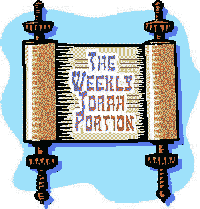Search our Archives:
» Home
» History
» Holidays
» Humor
» Places
» Thought
» Opinion & Society
» Writings
» Customs
» Misc.
|
The Seeing Heart
By Michael Chessen
It is perhaps most appropriate that Israel's Ministry of Tourism has
taken its icon, the image of two men bearing a "larger than life" cluster of
grapes on a pole, from the Torah portion of Shelach. This is because this
week's Torah reading is perhaps one of the most illustrative readings in the
five books of Moses. Not only does the portion contain some very vivid
descriptions of the Land of Israel (both objective and later tragically
exaggerated), but we also witness the manifestation of previously warned
against spiritual degeneration liable to befall us, and view just how one might
come to stray from following the Torah's commandments.
The Rashi commentary points out that the incident of the spies, or
simply "scouts", follows the incident of Miriam speaking ill of Moses in
order to demonstrate the consequences of failing to internalize the moral
lessons of Miriam's behavior and subsequent process of atonement. This
omission on the part of the spies fulfills an earlier prophesy in Leviticus
which states that the failure to diligently learn and study God's Torah
ultimately leads to a denial of God's supreme holiness. After initially
praising the Land of Israel the spies begin to slander it by the statement
which is taken simply as saying that the inhabitants of Kena'an are "stronger
than us" (Numbers 13:3). The Hebrew pronoun in this verse, however, is
ambiguous, and could also be translated as "him". Indeed, the spies' subsequent
"evil report" demonstrates that they appear to suggest that even God Himself
would be of no match for their future enemies.
The term "spies" is not explicitly mentioned in our reading, but we
elicit it from the Torah's usage of the Hebrew "latoor", "to seek" in
describing the mission of the twelve chosen scouts. The Torah subsequently uses
this same verb at the end of our reading in prescribing the commandment to
attach tassels, or "tzitzith" to the corners of one's garments. These are to
serve us as a visual reminder of our obligation to serve God in holiness.
However, in continuing that these reminders will help prevent our being led
astray, or perhaps more precisely "mis-seek", the Torah warns us first against
our hearts and then against our eyes. It would seem that in striving to follow
the path of holiness, what we happen to see counts less than what our hearts
are actually seeking.
Rabbi Yissocher Frand links the concept of the "seeing heart" back to the
sin of the spies by referring to the blessing that one should "see the goodness
of Jerusalem"(Psalms 128). On the surface, this appears to be a blessing that
one should merit seeing Jerusalem enshrined in messianic splendor. However,
Rabbi Frand points out that "seeing" the goodness of Jerusalem could also refer
to the ability to discern the goodness of the "not yet perfect" Jerusalem of
the present, and by extension, the modern State of Israel. The proper sense of
perspective will hopefully help us all to hasten the coming of the more perfect
era by enabling us to serve God and keep His Torah more genuinely in happiness.
Wishing you all a Shabbat Shalom !

|
|
Please let us know if you see something unsavory on the Google Ads and we will have them removed. Email us with the offensive URL (www.something.com)
|





|
